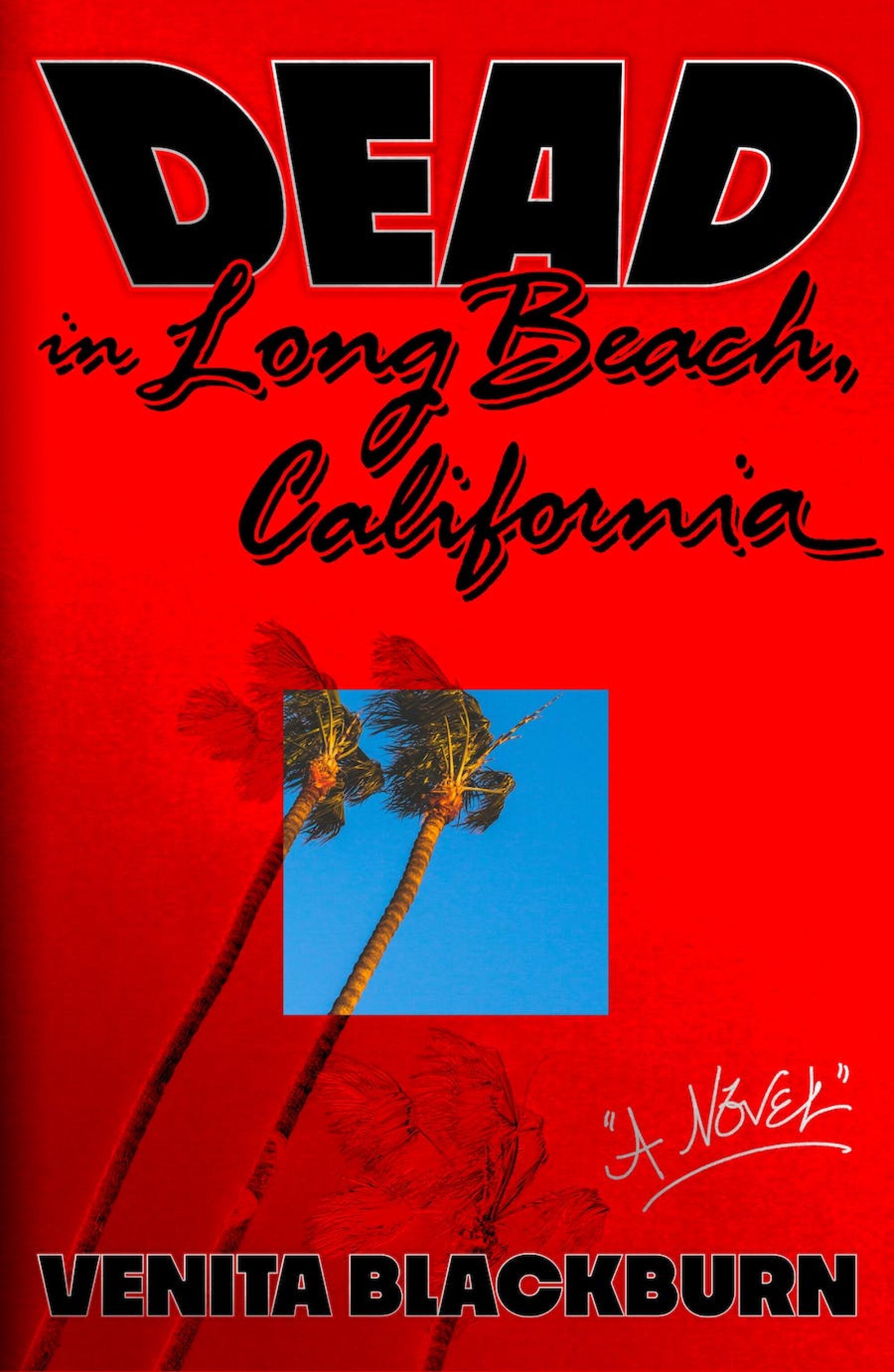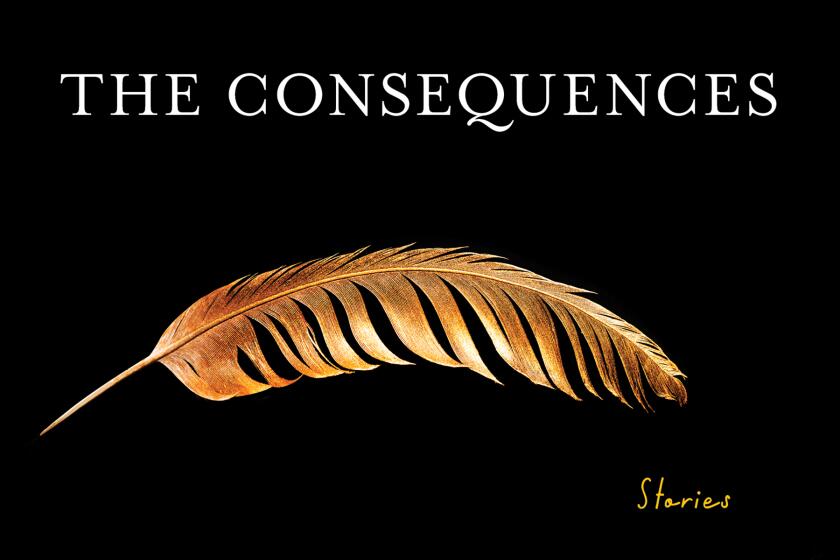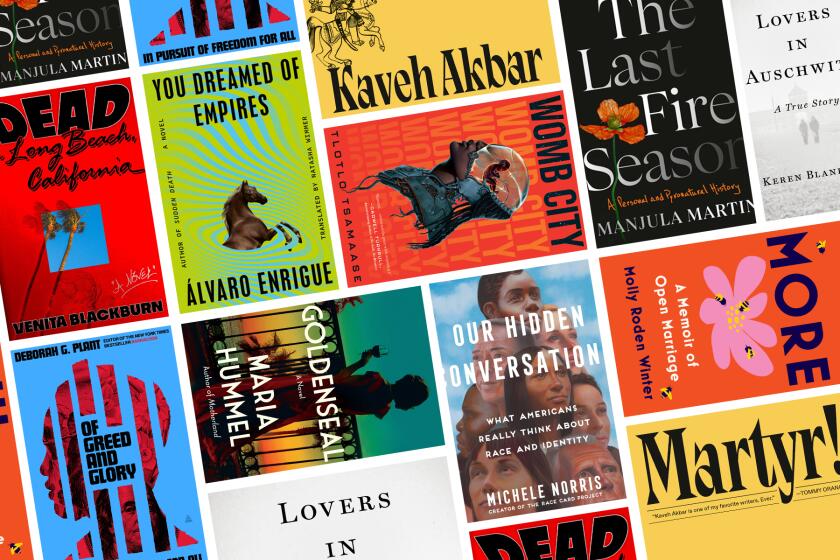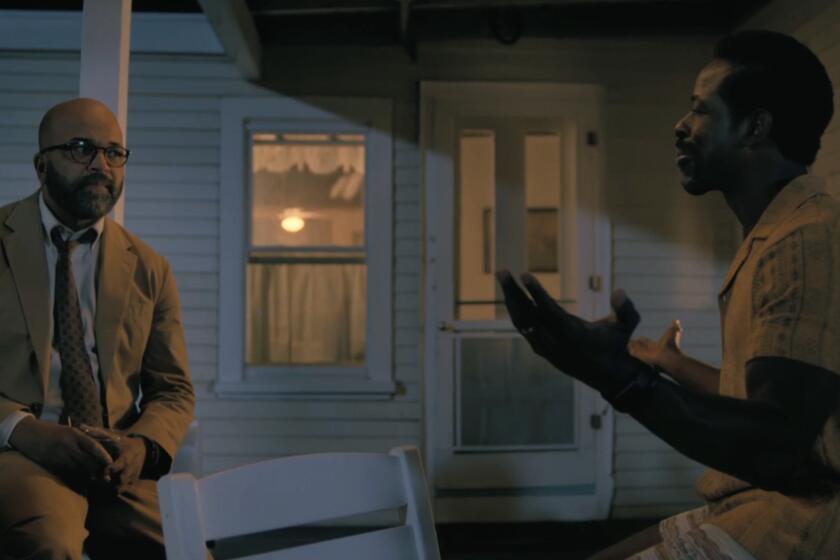
On the Shelf
Dead in Long Beach, California
By Venita Blackburn
MCD / FSG: 240 pages, $27
If you buy books linked on our site, The Times may earn a commission from Bookshop.org, whose fees support independent bookstores.
Fresno — There are no wasted words in the fictions of Venita Blackburn. Her stories are quick as lightning; her sentences, entire lifetimes flashing by. A clause might pierce a character’s frailties, a word might tip the analysis into absurdity.
A young man in one story is “sticky from adolescence.” A woman in another carries a purse “too small for all her shame and addictions.” In “Easter Egg Surprise,” originally published in SmokeLong Quarterly in 2019, a father remembers his recently dead mother: “She was a junkie and a liar and owed me three hundred dollars, but she was good with my kid.”
“I consider myself a sentence writer,” says Blackburn, tending to a cup of tea in her Fresno dining room on an overcast December afternoon. Each sentence, she says, “needs to exist all by itself.”
Over more than a dozen years, Blackburn has sharpened her sentences to razor points in short-short stories. Many of these have been gathered in two acclaimed collections: “Black Jesus and Other Superheroes,” published in 2017, and “How to Wrestle a Girl,” which appeared four years later. In these pieces characters grapple with the fallout of abandonment, unrequited queer desire and ill-conceived crimes.
Muñoz’s stories are peopled by furtive figures who grapple with survival and loss. His most stunning depiction, however, is of the Central Valley itself
Now the writer who built her reputation on speed and brevity, who once described novels as “a big saggy mess,” is about to debut her own, highly anticipated first novel.
Reminded of her earlier appraisal of the form, Blackburn laughs: “I stand by that.”
And yet, “Dead in Long Beach, California,” out later this month, is anything but saggy. In this enthralling story about farcical invention in the face of calamitous grief, the writing is taut as ever. Coral E. Brown is a successful Los Angeles science fiction writer who, on a given Friday, finds her brother dead by suicide in his Long Beach apartment. Blindsided by the discovery, Coral not only keeps the news to herself, she appropriates her brother’s cellphone and proceeds to impersonate him in text messages, writing him back to life in brief exchanges with friends, presumed lovers and even his daughter.

“The book is not about healing,” says Blackburn. “It’s not about getting to the end of grief. It’s not about offering solutions. It’s about the particular feeling, the hard crack of disaster in a family — and not getting any answers.”
Most fascinating is how this story unfolds, not through a single point of view, but several — Coral’s many voices coming together to chronicle her unraveling. These include flashes of Coral’s exchanges with others as well as the fictional voice of the Glock-toting lesbian debt collector in her dystopic sci-fi tales. The dominant voice, however, is an omniscient first-person plural that evokes an ancient Greek chorus. “We are responsible for telling this story,” reads the opening line of the book, “mostly because Coral cannot.”
“I call them this hive librarian archive,” says Blackburn. “They’re sort of singing this world.” The author says she was partly inspired by the villainous Borg from “Star Trek,” which operate as a hive mind. “They have a sense of authority,” she says. “The ‘we’ gives you proof and evidence. You have peer review. The first person has the least amount of credibility. In all of these narrators, you are only getting one side.”
Bethanne Patrick recommends 10 new books to kick off 2024, including an alternate Mexican history, memoirs of wildfire seasons and open marriage and more.
On a quiet day between Christmas and New Year’s, Blackburn, 40, stands in her kitchen in Fresno, attempting to decipher the mechanics of a new electric teapot. Butter Bean, an elderly canine of terrier extraction, trots around the house in a sweater vest bearing a jangling sleigh bell. Blackburn’s sentences may be sharp, but she is easygoing in person — observing her own life with the same humorous remove as her characters.
Born in Harbor City and raised in Compton, the author is the third and youngest child of a pair of municipal employees. As a child, she adored reading and writing. “My mom would read stories to me until I could read them back,” she recalls. “I had this collection about historical figures.” Helen Keller was her favorite: “The drawings were funny. They show her as this wild girl. She can’t see, she’s throwing things around and being violent. I identified with her. I was like, I support you. These people around you? They don’t know what you’re about.”
But writing was not something she felt destined to do. At the University of Southern California, Blackburn chose to study business. “Who wants to be a starving artist?” she explains. “I resisted being a teacher, a writer, or calling myself an artist in any capacity. It was: Make money, go the corporate route — which is so antithetical to my personality.”
Writing, naturally, won out. By her junior year, she had switched her major to English with a focus on creative writing. She followed that with a master’s of fine arts at Arizona State University — a school she chose because one of her brothers lived in the area.

Gurba’s essays, collected in ‘Creep,’ showcase an unblinking gaze at gender-based violence and other cruelties, which the author would rather be known for.
In Arizona, Blackburn found her groove. She launched an early version of Live, Write, a free workshop for writers of color. And she began to delve into flash fiction, a form of short-short story that isn’t new (it can be traced to traditions like folk tales), but has grown in popularity in recent decades — fueled by the internet and a rising number of anthologies, including the landmark “Flash Fiction: 72 Very Short Stories” (1992).
As a grad student, Blackburn began trying her hand at this telegraphic style of storytelling. “It was still this bastard form that nobody had a lot of respect for,” she recalls. In fact, for her thesis, she wrote a novel. (“I didn’t like it.”) But the discovery of flash fiction ended up being “transformative.”
After completing her degree in 2008, she turned to the form almost exclusively — at one point cannibalizing her novel for a four-page short story. “I’m not,” she declares, “precious with my work.”
There were practical reasons for her pursuit. A day after Blackburn defended her thesis, her mother died. Following graduation, she found herself juggling teaching jobs around Phoenix to make ends meet. “It was a challenge to just survive the grieving stage,” she remembers. “I was up super early and would get home at 10 and I was writing around those times. There were these small periods of intense focus, writing before dinner. Being hungry helps — you’re a little distracted, but tapped into discomfort.”
But it was flash fiction’s possibilities, not its limitations, that most captivated her: “You see the beginning, the middle and the end. All the sentences have to do double meanings. It’s a dense form. It’s not poetry, but it’s as close as prose can get.”
In 2016, she entered a collection of her stories for the Schooner Book Prize at the University of Nebraska, expecting to earn perhaps an honorable mention. One night, a phone call interrupted her viewing of “Bob’s Burgers”: She’d won the main prize. The collection was published by the University of Nebraska Press the following year as “Black Jesus and Other Superheroes.”
Since then, Blackburn’s profile has risen exponentially. Publication led to a tenure-track job teaching creative writing at Fresno State. Her stories began appearing in the New Yorker and the Paris Review. MCD Books at Farrar, Straus & Giroux published her second book, “How to Wrestle a Girl,” in 2021, a collection focused on teen girls and the authority figures who invariably let them down. It included stories in unusual formats — laid out as crossword puzzles or a multiple choice quizzes. The New York Times hailed it as “bold, witty, ominous.”

‘American Fiction,’ an Oscar-buzzy film starring Jeffrey Wright, began as Percival Everett’s scathing novel ‘Erasure.’ Here’s how the story transformed
Lauren Kane, then an editor at the Paris Review (she’s now at the New York Review of Books), featured the collection as a staff pick. “It was like reading a new Diane Williams,” Kane told me via email. “She handles prose with such a cool intensity. ‘How to Wrestle a Girl’ is a real master class in how to be formally experimental without losing the plot.”
Intensity and experimentation have definitely survived the transition to long-form writing — along with Blackburn’s exquisite sentences, which burst with heartbreak, rivalries and machinations. “The Aunts were a council of sorts,” begins one chapter of “Dead in Long Beach,” “a kind of republic that conferred among one another and plotted against one another, formed factions and insurgencies, yet theoretically acted toward the same goal, which was judging Coral’s behavior.”
As Blackburn awaits the publication of her first novel, she is already exploring a second — inspired by a short story she wrote for Gagosian Quarterly, about a romantic union between a ghoul and a poltergeist in the Reconstruction-era South. Blackburn is compelled by the idea that “the essence of ourselves never disappears, it just becomes something else.”
Has she been haunted by ghosts? “We all have our stories of seeing ghosts,” she replies. “If I’m visited, no one says anything. They just kind of look at me judge-ily, they give me side-eye.”
I imagine her ghosts are more approving. In a collective voice they might say, You are responsible for telling this story, because we cannot.
More to Read
Sign up for our Book Club newsletter
Get the latest news, events and more from the Los Angeles Times Book Club, and help us get L.A. reading and talking.
You may occasionally receive promotional content from the Los Angeles Times.










